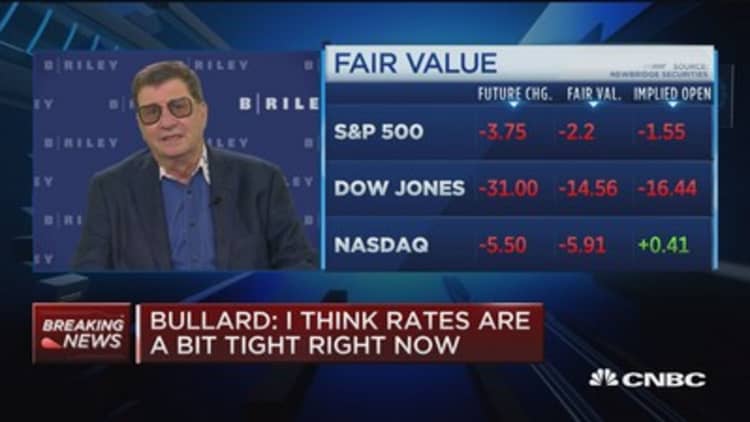
Stocks fell on Thursday following the release of lackluster U.S. economic data and amid ongoing trade discussions between the Trump administration and its Chinese counterparts.
The Dow Jones Industrial Average fell 103.81 points to 25,850.63 as Walgreens Boots Alliance lagged. The dipped 0.35 percent to 2,774.88, led lower by the energy and health care sectors. The Nasdaq Composite fell 0.4 percent to 7,459.71, snapping an eight day winning streak.
Durable goods orders for December rose 1.2 percent, the Commerce Department said. The department also said core capital goods orders fell 0.7 percent while economists polled by Reuters expected a gain of 0.2 percent.
The Philadelphia Federal Reserve business index fell to negative 4.1 in February — its lowest level since May 2016 — from 17 in January. Economists polled by Dow Jones expected a print of 14.
"The fundamental data, as it gets worse, will start having a negative effect on asset prices again over the next couple of quarters," said Hugo Rogers, chief investment strategist at Deltec International Group. "At that point, the Fed might have to do something more dramatic than waiting and seeing."
IHS Markit also said its U.S. manufacturing purchasing managers' index fell to 53.7 in February, a 17-month low, from 54.9 last month. IHS Markit said in a release that survey respondents cited "a soft patch for client demand, partly linked to uncertainty across manufacturing supply chains and concerns about the global trade outlook."
Meanwhile, the Conference Board's leading economic index fell for the second straight month in January, marking the index's first back-to-back pullback since early 2016.
The data releases come a day after the Federal Reserve released the minutes from its January meeting. The minutes highlighted downside risks to the U.S. economy, including "a rapid waning of fiscal policy stimulus, or a further tightening of financial market conditions."
However, the Fed also hinted it may end its balance-sheet normalization process faster than expected. This would be positive for equity investors, as many see the reduction of the balance sheet as a form of tighter monetary policy.
Equities closed slightly higher on Wednesday, adding to the recent sharp gains in stocks. The S&P 500 is up more than 10 percent this year as the Fed signaled patience in future rate hikes and amid perceived progress in U.S.-China trade talks.
"Risk markets continue to probe higher with the SPX index … effectively completing the right hand side of the 'V,'" wrote Michael Shaoul, chairman and CEO of Marketfield Asset Management. "With earnings season winding down, the FOMC minutes now released and some sort of a trade deal (or benign extension past March 1st) priced into the market further progress may be hard to squeeze out of the headline index."
Officials from China and the U.S. met again in Washington on Thursday. Reports early Thursday morning said Washington and Beijing have begun drawing up memorandums of understanding over trade.
The U.S. and China are trying to resolve their differences over trade ahead of a March 1 deadline. However, speculation has risen that there may be an extension to that target, after President Donald Trump said it was not a "magical date."
"Tariff news outweighs everything. There was no major news on trade, so the market is trading on what's out there," said JJ Kinahan, chief market strategist at TD Ameritrade. "What's out there today, there's not that much excitement to it."
Nike shares fell 1 percent after star Duke University basketball player Zion Williamson broke his shoe at the start of a highly anticipated game. The break led to Williamson hurting his knee.
—CNBC's Ryan Browne contributed to this report.


